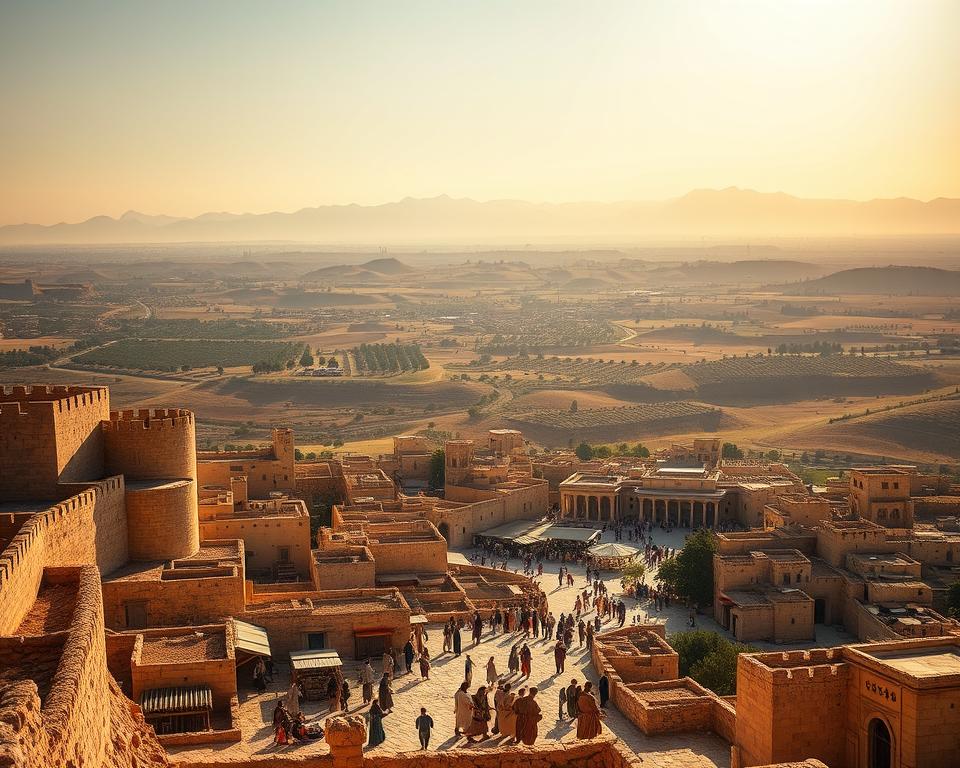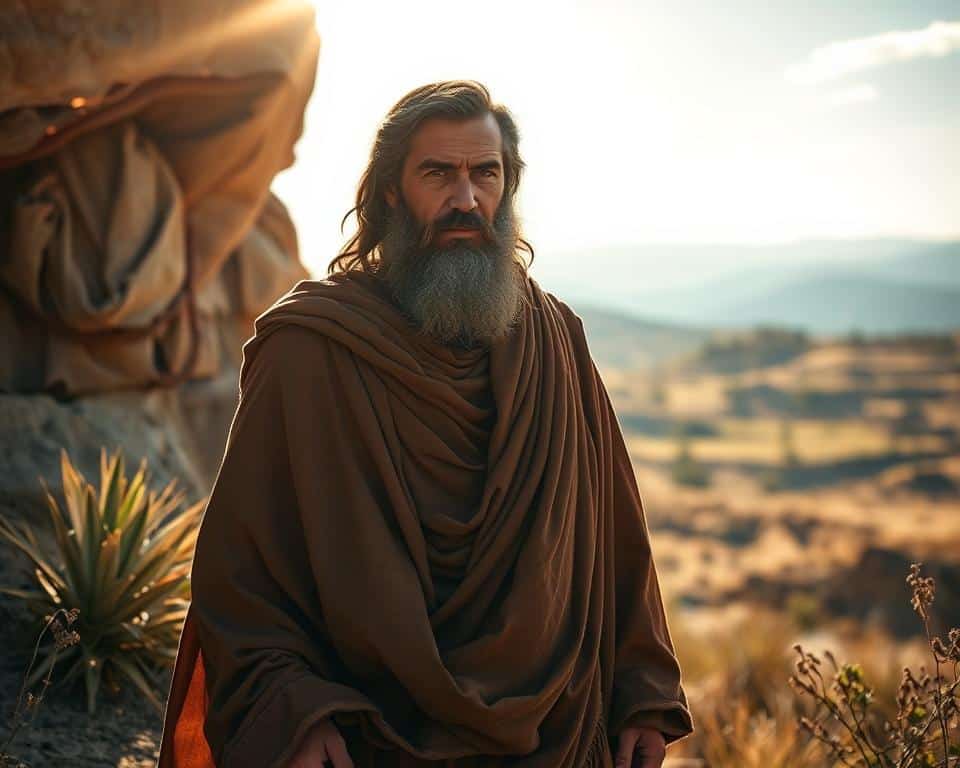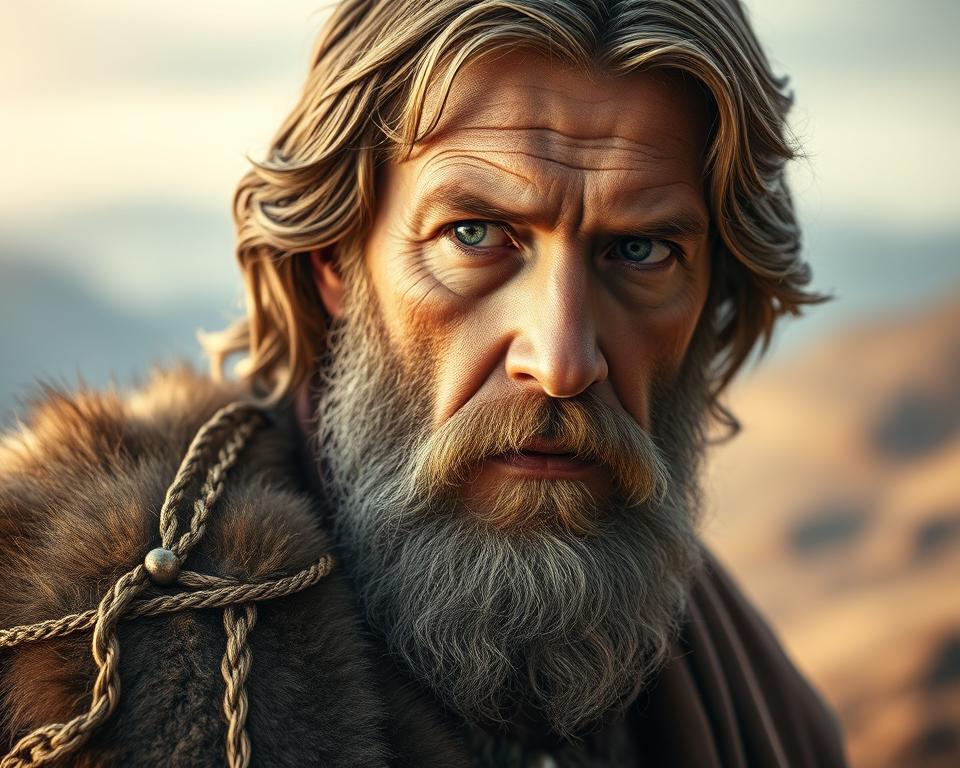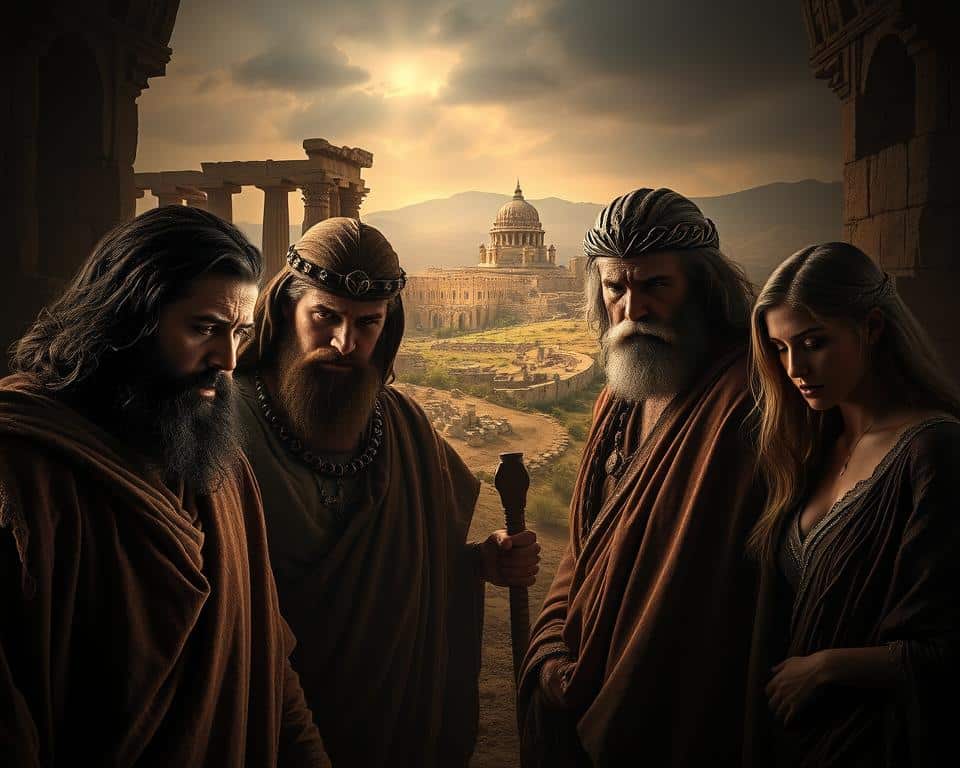Have you ever wondered what it takes to stand firm in faith when the world around you seems to crumble? The story of Elijah offers a powerful answer. As a prophet in the Bible, Elijah’s journey is marked by extraordinary miracles and bold confrontations with false worship.
Elijah’s life is a testament to unwavering trust in God. From being fed by ravens to reviving a widow’s son, his actions reveal a deep reliance on divine power. His confrontation with the prophets of Baal on Mount Carmel is a defining moment, showcasing his courage and faith.
This article explores Elijah’s legacy, drawing lessons for modern believers. His story reminds us to trust God’s word, even in the face of adversity. Let’s dive into his journey and discover how his faith can inspire us today.
Who is Elijah?
Who was Elijah, and why does his story still resonate today? He is one of the most prominent figures in the Hebrew Bible, known as a prophet who stood firmly for God’s truth. Elijah’s name means “My God is Jah,” reflecting his unwavering faith in the Lord.
He is often referred to as “the Tishbite,” a title that points to his origins. This man of God lived during a time when idolatry was rampant in Israel. His mission was to confront false worship and call people back to the one true God.

Elijah’s role as a servant of God was marked by extraordinary events. From his early days, there were signs of his divine calling. Some traditions even suggest that angels appeared around him as an infant, hinting at his future purpose.
This person of deep faith didn’t just deliver messages from God—he lived them. His courage in challenging the prophets of Baal on Mount Carmel is a testament to his trust in God’s power. Elijah’s life continues to inspire believers to stand firm in their faith, even in the face of adversity.
The Historical Context of Elijah in Israel
Elijah’s story unfolds during a turbulent time in Israel’s history. The nation was deeply divided, with the northern kingdom of Israel and the southern kingdom of Judah often at odds. This division created a challenging environment for faith and leadership.
King Ahab ruled the northern kingdom during this period. His reign is marked by widespread idolatry, largely influenced by his wife, Jezebel. She promoted the worship of Baal, a foreign god, leading to the construction of altars and shrines across the land.

The Old Testament records how this conflict between Baal worship and the worship of the one true God shaped Elijah’s mission. Historical accounts, including those in the book of Kings, highlight the internal strife and religious tension of the time.
Elijah’s message was a call to return to God’s truth. His boldness in confronting Ahab and the prophets of Baal was rooted in this historical context. Understanding this backdrop helps us appreciate the depth of his faith and the urgency of his mission.
This period in Israel’s history reminds us of the importance of standing firm in our beliefs, even when the world around us seems to falter. Elijah’s story continues to inspire believers to trust in God’s word, no matter the challenges they face.
Essential Events in the Life of Elijah
Elijah’s story is filled with moments that reveal God’s power and faithfulness. These events not only shaped his ministry but also offer timeless lessons for us today. Let’s explore two key miracles that highlight God’s provision and care.
Provision by Ravens and the Widow’s Miracle
During a severe drought, God provided for Elijah in unexpected ways. He was fed by ravens, who brought him bread and meat daily. This miracle shows how God uses both natural and supernatural means to care for His servants.
Later, Elijah met a widow in Zarephath. Despite her limited resources, God used her to provide for the prophet. Her jar of flour and jug of oil never ran out, demonstrating God’s faithfulness even in scarcity.
Resurrection of the Widow’s Son
One of the most remarkable events in Elijah’s ministry was the resurrection of the widow’s son. When the boy fell ill and died, Elijah prayed fervently. God answered, and the child was brought back to life. This was the first recorded instance of raising the dead in Scripture.
These miracles underscore Elijah’s role as God’s messenger. They remind us that God’s power is limitless, and His provision is always timely. Through these events, we see a clear picture of faith in action.
Life of Elijah: A Journey Through Extraordinary Miracles
What does it mean to witness God’s power in action through miracles? The story of Elijah is a testament to how faith can lead to extraordinary divine interventions. His life was marked by supernatural events that revealed God’s unwavering support and provision.
Elijah’s reliance on prayer was central to his journey. Whether it was calling for rain to end a three-year drought or reviving a widow’s son, his prayers were answered in miraculous ways. These events remind us that God’s power is limitless and His timing is perfect.
One of the most striking parallels in Scripture is between Elijah and John the Baptist. Both were called to prepare the way for God’s work, demonstrating the same boldness and reliance on the spirit. Their lives inspire us to trust in God’s calling, even when the path seems uncertain.
Every miracle in Elijah’s story underscores God’s trustworthiness. From being fed by ravens to the showdown on Mount Carmel, these events were not just for his time but for ours too. They teach us that faith, combined with prayer, can move mountains.
Elijah’s journey is a powerful reminder that God is always at work in our lives. His life encourages us to seek His presence, trust His promises, and believe in the possibility of the miraculous. Through his example, we are inspired to walk in faith, no matter the challenges we face.
Elijah’s Confrontation with Idolatry on Mount Carmel
What happens when faith is put to the ultimate test in the face of widespread idolatry? Elijah’s showdown on Mount Carmel is one of the most dramatic moments in Scripture. It’s a story of bold faith, divine power, and a public declaration of God’s supremacy.
The Test of Fire
Elijah challenged 450 prophets of Baal to a contest to prove whose god was real. The setting was Mount Carmel, a place symbolic of spiritual confrontation. Elijah instructed the prophets of Baal to prepare a sacrifice and call on their god to send fire. Despite their frantic efforts, there was no response.
Then, Elijah stepped forward. He rebuilt the altar of the Lord using 12 stones, representing the tribes of Israel. He soaked the altar with water three times, ensuring it was thoroughly drenched. In a powerful prayer, Elijah called on God to reveal Himself. Immediately, fire fell from heaven, consuming the sacrifice, the altar, and even the water.
Public Declaration of Faith
The people witnessing this miracle were in awe. They fell on their faces and declared, “The LORD—he is God!” This moment was a turning point, as the people recognized the futility of worshiping Baal. Elijah’s boldness and faith had exposed the emptiness of idolatry.
This event on Mount Carmel reminds us that true faith is not about rituals or numbers. It’s about trusting in the power of God, even when the odds seem impossible. Elijah’s story encourages us to stand firm in our faith, knowing that God is always with us.
Encounters with King Ahab and Jezebel
What does it look like to stand against corruption and idolatry in a world that opposes truth? Elijah’s interactions with King Ahab and Jezebel reveal the cost of disobedience to God and the courage required to uphold divine truth.
Elijah confronted Ahab directly, warning him about the consequences of his wicked policies and idolatry. The king had led Israel into widespread sin, promoting the worship of Baal. Elijah’s boldness in delivering God’s message highlighted the corruption of the royal household.
After the dramatic showdown on Mount Carmel, where Elijah proved God’s supremacy, Jezebel responded with deadly threats. She vowed to make Elijah like one of the slain prophets, giving him 24 hours to flee. This moment underscores the tension between divine truth and human rebellion.
Elijah’s prophetic warnings about death and divine retribution were clear and factual. Despite the danger, he remained steadfast in his mission. Both Ahab and Jezebel rejected God’s truth, choosing instead to cling to their idolatrous ways.
These encounters remind us of the cost of standing for God’s truth. Elijah’s courage in the face of opposition inspires us to remain faithful, even when the world around us opposes God’s word. His story challenges us to examine our own lives and align them with divine truth.
Refuge and Renewal in the Wilderness
In moments of fear and uncertainty, where can we find renewal and strength? Elijah’s journey to the wilderness offers a powerful answer. After fleeing the threat of Jezebel, he sought refuge in a place of solitude. The drought that had plagued the land mirrored his own need for refreshment.
Elijah found himself near a river, a symbol of life and renewal. This natural setting became a place of reflection and divine care. The flowing waters reminded him of God’s provision, even in the most challenging times. Here, he could reconnect with God through prayer.
During this time of isolation, Elijah met Elisha, a young man who would later carry on his prophetic legacy. This encounter was a turning point, as it set the stage for the continuation of God’s work. Elijah’s time in the wilderness was not just about escape but also about preparation for what was to come.
God’s care was evident even in Elijah’s moments of fear. The wilderness, often seen as a place of desolation, became a sacred space for renewal. It reminds us that even in our darkest times, God is present, offering hope and strength.
Elijah’s experience teaches us the importance of seeking God in solitude. Whether by a river or in the quiet of our hearts, we too can find renewal. His story encourages us to trust in God’s care, even when the path ahead seems uncertain.
Elijah’s Relationship with Followers and Disciples
How does mentorship shape the future of faith and leadership? Elijah’s relationships with his followers reveal a deep commitment to nurturing the next generation of servants of God. His mentorship was not just about teaching but also about modeling faith and courage.
One of the most significant relationships was with Elisha, whom Elijah called to be his successor. When Elijah threw his cloak over Elisha, it symbolized the transfer of prophetic authority. Elisha’s immediate response—leaving his oxen and following Elijah—showed his readiness to embrace God’s calling.
Elijah’s mentorship extended beyond Elisha. Obadiah, a loyal follower, risked his life to protect 100 prophets during a time of persecution. His dedication reflected the heart of a true servant, willing to stand for God’s truth even in danger.
These relationships remind us of the importance of mentorship in God’s work. Elijah’s example encourages us to invest in others, preparing them to carry on the mission. His life shows that leadership is not just about personal achievements but about empowering others.
Like John the Baptist, who prepared the way for Jesus, Elijah’s ministry laid the foundation for Elisha’s work. Their partnership highlights the continuity of God’s plan, where one generation passes the torch to the next.
Elijah’s story invites you to reflect on your role in mentoring others. Whether in your family, church, or community, you can inspire and guide others in their faith journey. His legacy reminds us that true leadership is rooted in service and a heart for God’s work.
Scripture and Cross-Religious Impact of Elijah
How does a prophet from the Old Testament influence multiple faiths and traditions? Elijah’s story is not just a bible story; it’s a bridge between Jewish and Christian beliefs. His life and miracles are celebrated across religious boundaries, showing the unity of God’s word.
In the Old Testament, Elijah is a central figure who stood against idolatry and called people back to God. His dramatic showdown on Mount Carmel and his miraculous acts are foundational to the scripture. These events are not just historical; they carry deep spiritual significance for believers today.
Elijah’s influence extends into the New Testament. He appeared with Jesus and Moses during the Transfiguration on the mount. This moment confirmed his importance in God’s plan. Jesus himself referenced Elijah, connecting his ministry to the prophet’s legacy.
John the Baptist was seen as fulfilling Elijah’s prophetic role. John prepared the way for Jesus, just as Elijah called people to repentance. This connection highlights the continuity of God’s work across generations.
Elijah’s impact is recorded in both scripture and later religious traditions. His story reminds us of the power of faith and the importance of standing for truth. It invites you to reflect on the unity and diversity of biblical witness.
Through Elijah’s story, we see how God’s word transcends time and culture. His legacy challenges us to live boldly for God, knowing that our faith can inspire others across generations and beliefs.
Lessons from Elijah’s Life for Modern Faith Walk
What can we learn from a person who faced drought, idolatry, and despair with unwavering faith? Elijah’s story is filled with practical lessons for us today. His experiences remind us that God’s provision is always enough, even in the hardest times.
When Elijah faced a severe drought, he trusted God to provide. Ravens brought him food, and a widow’s jar of oil never ran out. These miracles show that God cares for us, even when resources seem scarce. Like Elijah, you can trust God’s timing and provision.
Elijah’s boldness in confronting evil is another key lesson. On Mount Carmel, he stood alone against 450 prophets of Baal. His faith in God’s power led to a miraculous victory. This teaches us to face challenges head-on, trusting that God is with us.
Even in moments of fear, Elijah found renewal. After fleeing Jezebel’s threats, he rested by a river and prayed. God strengthened him, showing that rest and prayer are essential for spiritual growth. When you feel overwhelmed, take time to seek God’s presence.
Reading Elijah’s story in the book of Kings can inspire your own faith journey. His life shows that God uses ordinary people to do extraordinary things. Whether you’re facing a drought, a challenge, or a moment of doubt, Elijah’s example reminds you to trust God’s plan.
Elijah’s life teaches us to persevere. His faith wasn’t perfect, but he relied on God in every event. Let his story encourage you to walk boldly in your own faith, knowing that God is always with you.
Final Reflections on Elijah’s Lasting Legacy
How does a prophet’s departure in a chariot of fire inspire faith across generations? Elijah’s story is a powerful reminder of God’s faithfulness and the impact of standing for truth. From the miracles on Mount Carmel to his dramatic exit, his life continues to guide believers today.
Elijah’s departure in a chariot symbolizes divine approval and hope. It reminds us that God’s work doesn’t end with death but continues through those who follow Him. His legacy is echoed in the ministries of Jesus and John the Baptist, showing the enduring power of faith.
In every place and time, Elijah’s story encourages us to trust God’s word. His example inspires leaders and everyday believers to walk boldly in faith. Let his life remind you that God’s truth endures, offering hope and guidance for all who seek Him.





